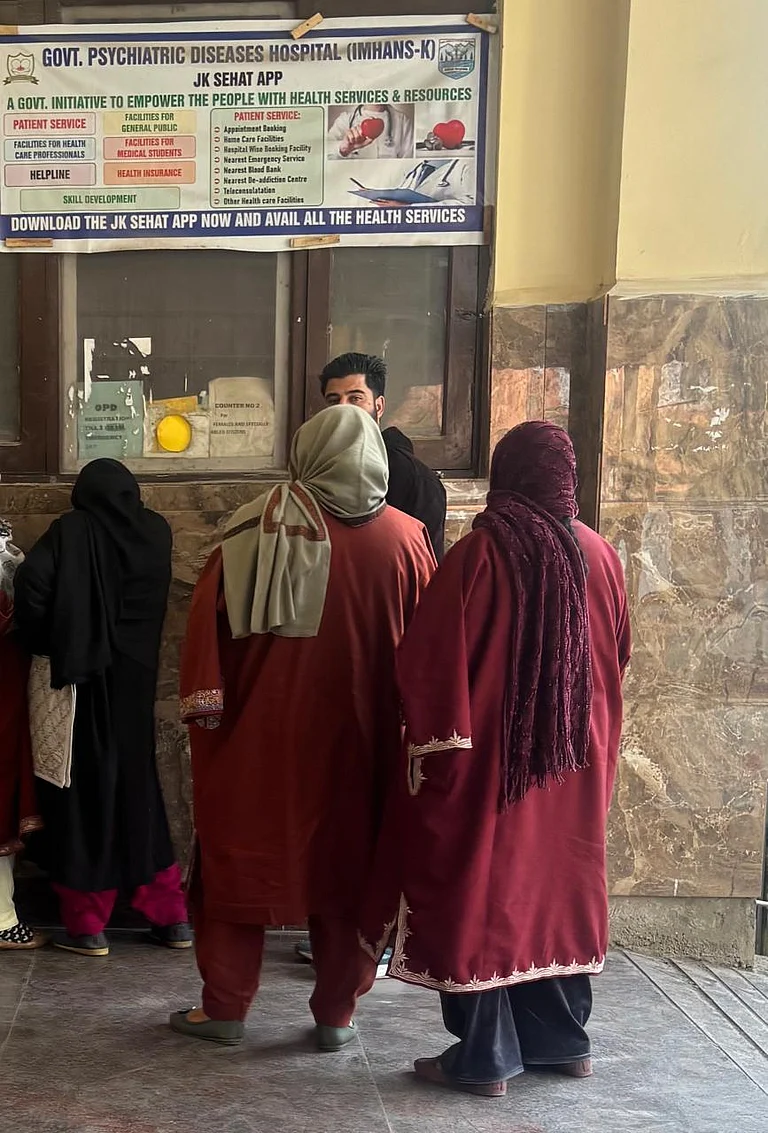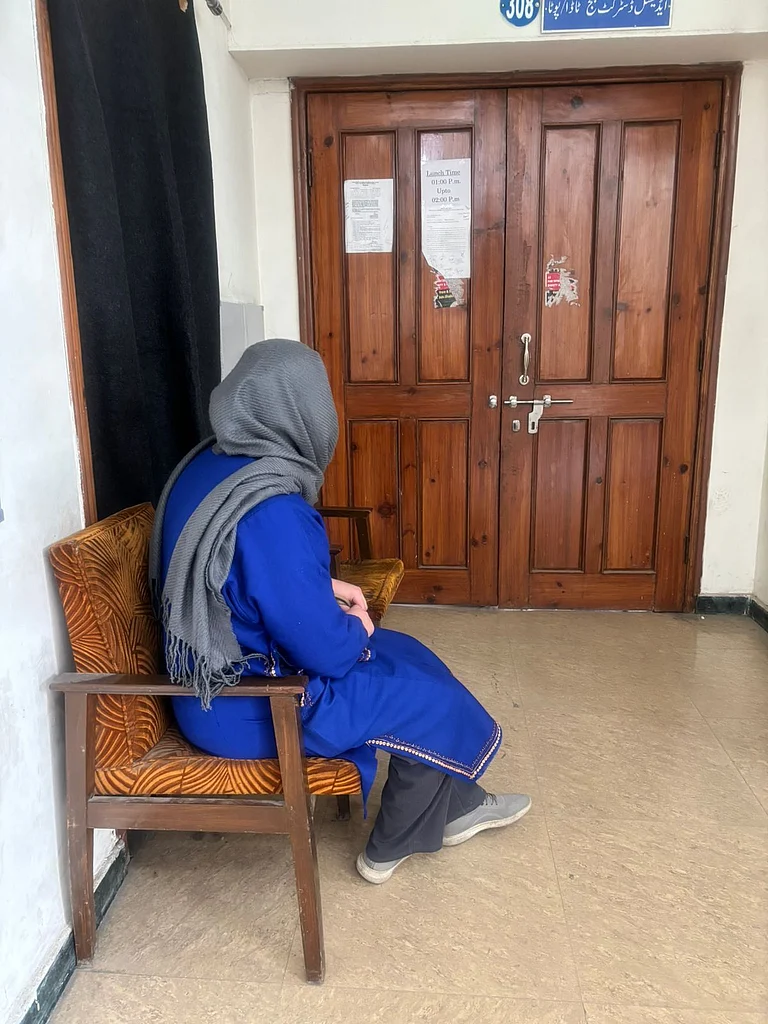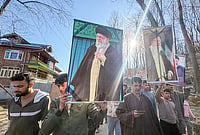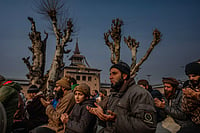
Mental health in Kashmir remains tangled in belief, stigma and unequal care.
Traditionally, Kashmiris turn to faith healers to seek cures for mental health disorders, often at the peril of the patients involved.
Doctors claim the mental health crisis in Kashmir has worsened.
After finishing her household chores, 36-year-old Haleema Begum walks out to a field near her home in north Kashmir and begins rubbing mud on her face and arms. Despite having cleaned the house and done the laundry, she believes the only way to truly feel clean is by scrubbing fistfuls of earth on her skin. Her family initially blamed her unusual ritual on possession by a djinn and turned to faith healers for help. It was only after her behaviour escalated and she began soiling freshly washed clothes with mud that her husband sought formal medical advice.
“We went to hundreds of peers (faith healers), but there was no improvement in her condition. Many people told me that she was possessed by a djinn, but her condition only deteriorated, so we had no alternative but to consult the doctors,” said Haleema’s husband, Altaf Ahmad Shah, 39, an insurance agent. Altaf flipped through pictures on his phone, taken in a field near their house, showing his wife’s face and hands covered with mud. “After she had finished her household chores, she would go into the field and smear herself with mud,” he said with moist eyes.
Altaf used to travel for hours from North Kashmir to Srinagar in search of faith healers, before finally turning to a psychiatrist. These days, he often skips work to accompany his wife for treatment, making the four-hour journey to the city. A counsellor attended to her diagnosed her for a obsessive-compulsive disorder, marked by compulsive behaviours. Altaf says the medication has brought some improvement.
The family of Mehfooz Bashir, a skull cap-wearing tenth-class student, also turned to a faith healer, believing the boy had caught the evil eye. Mehfooz’s father, Bashir Ahmad, thought his son became unwell after he delivered a sermon at a mosque near their home in central Kashmir. He first went to a local cleric, then to faith healers who offered prayers for recovery. But the boy continued to show signs of depression and stayed withdrawn. It was only after Bashir had wasted several thousand rupees on these visits that he decided to consult a psychiatrist in Srinagar. Doctors later confirmed Mehfooz was dealing with clinical depression, not spiritual possession and treatment is now ongoing.
“My son gave a sermon in the mosque and fell ill only after that. It was nothing but the evil eye. His condition didn’t improve even after we went to many faith healers, which is why I have now come for a consultation with the psychiatrist. Doctors have told us that he is suffering from depression,” he said.
Traditionally, Kashmiris regularly turn to faith healers to seek cures for mental health disorders, often at the peril of the patients involved. According to local doctors, they have received several cases of patients who faced traumatic experiences after their families took them to faith healers in the hope that they would be cured.
A psychiatrist said that a patient under his treatment had received injuries to his fingers after a faith healer tried to wrench them with a pincer. The patient, he said, was suffering from ‘possession syndrome.’
Several healthcare professionals working on mental health issues said there is a “culture-bound syndrome” prevalent in Kashmir that views mental illness through the lens of people being possessed by djinns. There have been more severe cases of bodily harm in the past. In May 2022, police arrested a faith healer after he beat a woman to death in South Kashmir’s Shopian. Her family had gone to him seeking a cure for what they believed was possession by “evil spirits.”
A burly faith healer in Central Kashmir’s Budgam district, Nazir Ahmad, who sports a well-trimmed flowing white beard, claimed he has cured people possessed by djinns. He said he recites Islamic verses to heal them. “A number of people come and visit my house here and they have different ailments like heartache and headache and they get cured,” said Nazir, in one of the rooms of his ramshackle wood and mud house, resting his back against a wall. Nazir fiddled with a knife, its tip pressed against a wooden desk; a practice that is common with dervishes who claim to cure toothaches or to exorcise djinns.
Nazir, however, grew irritated when pressed on how long he had been practicing as a faith healer and how he offered cures for mental illness. “You can’t understand this. How can I tell you that this is a realm that requires an entirely different understanding?" As soon as a sonorous call to prayer was heard, Nazir hurried out from the yard of his house into the steep street, at one end of which stood a mosque. And that was the end of the conversation.
Local residents said that people from across Kashmir, who believe they are possessed by djinns, visit Nazir’s house to seek a cure. “He has been a peer for the last 25 years and people from across Kashmir have been coming to him for a cure,” said Ghulam Hassan, a local resident. Hassan added that Nazir became a faith healer after he retired from his job as a lineman with the Power Development Department (PDD). “This is a matter of faith and the people who come here believe that they will get cured and they actually recover,” said Hassan, an elderly man.
In Kashmir, faith healers are often the first stop for people grappling with mental health disorders and can be found in almost every neighbourhood. People turn to them for the cure of all sorts of ailments, including mental health issues, and even seek blessings to succeed in exams or to gain employment.
For some, faith healing is a family tradition. Mohd Shafi, 75, a resident of Budgam district, said he had inherited the practice from his father. “Many people come to me daily and I at least receive five to eight visitors, particularly on Sundays. But I advise people who have mental health complications to visit a doctor,” he said.
Shafi ran his eyes over a wooden desk that rested on the windowsill of the house, with some religious books stacked up on it, as he spoke about how he would chant Islamic verses and blow into water, which people assume was a cure or he would roll pieces of paper with sacred words and hand them out. He said it was his followers who provided him money and helped add another floor to his multi-storey house, whose upper floor incidentally has no windows. A small mosque, with a tin minaret, stands outside the gate.
Several self-styled dervishes have also claimed that they can summon the djinn they believe is possessing a person, though doctors insist that it is mental health that lies at the root of such behaviour, not supernatural forces.
Doctors claim the mental health crisis in Kashmir has worsened, as people approach them at a late stage, making treatment more difficult.
Healthcare professionals associated with the mental health programme in Kashmir have said there is a need to create awareness so that people access health facilities instead of visiting faith healers early on. “We have seen people come late to us and spend a good deal of money visiting the faith healers. People turn to faith healers for the cure of ailments. I recently received a patient who was subjected to bodily harm by a faith healer,” said prominent Kashmiri psychiatrist Prof. Yasir Rather.
Several Islamic scholars also strongly disagree with the practice of charlatans duping people of their money by claiming to cure diseases like possession syndrome.
“The issue is very grave. Because of ignorance, people turn to faith healers for such medical complications, which should have been handled by doctors, like depression or suicidal thoughts. We have seen self-styled faith healers resort to extreme measures and how people were physically harmed. Deaths have also been reported here, as people were thrashed by faith healers. I think people need to understand Islamic values in the right perspective and not to get misled by such people,” said Bilal Ahmad Wani, assistant professor at Kashmir University's Shah-i-Hamadan Institute of Islamic Studies.
Mental health in Kashmir remains tangled in belief, stigma and unequal care. For many, the faith healer is still closer than the clinic. Doctors and scholars are clear-eyed about the risks, but the shift away from superstition is slow and uneven. Meanwhile, families continue to walk the long route, from the shrine to the psychiatrist, looking for answers, after not finding them at the journey’s first leg.





























